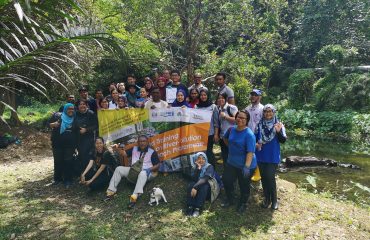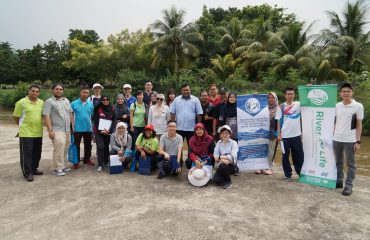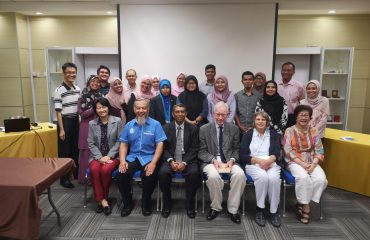Climate Change Impact on Water Resources in Malaysia – Role of Capacity Development



The Malaysian Capacity Development Network for Sustainable Water Management (MyCDNet) successfully organised and carried out its Biennial National Forum 2023 on 17 August at National Water Research Institute of Malaysia (NAHRIM), Selangor, with the theme Climate Change Impact on Water Resources in Malaysia – Role of Capacity Development. The Forum commenced with the Welcoming Address by MyCDNet’s Network Manager, Yang Berbahagia Dato’ Ir. Lim Chow Hock, who spoke about MyCDNet and its commitment to capacity building.

The Forum was divided into two sub-themes comprising three paper presentations for Sub-theme 1 and an open forum session for Sub-theme 2, with a panel Q & A segment after each sub-theme. There was one Keynote Address before each sub-theme in this full-day event. The speakers, moderators, panellists and paper presenters were hand-picked specialists in the chosen topics. Based on participants’ responses and comments, the Forum was very well organised with contents that were valuable, insightful and beneficial to their overall learning objectives.
The morning session started with Keynote Address I by Dr. Ching Thoo A/L Kim, Deputy Secretary General (Water & Sewerage) at the Ministry of Natural Resources, Environment and Climate Change. It was presented by Ir. Mohd Zaki bin Mat Amin, Director General of NAHRIM, on mapping the trajectory for water-climate nexus in Malaysia, in terms of water planning, policy and building capacity in water management with the national agenda of transforming the water sector into a dynamic economic sector.

There were three paper presentations for Sub-theme 1 on Current CCA & Water Progress in Malaysia: Science, Policy and Implementation, chaired by Ir. Hj. Md Khairi Selamat, MyCDNet’s Deputy Network Manager.

Paper 1 – “Modelling to Better Understand the Past, Current and Future Climate in Malaysia” by Dr. Liew Ju Neng, Assoc. Prof., Universiti Kebangsaan Malaysia (UKM), highlighted the importance of modelling climate change projection as the way forward. He emphasized the need for understanding the uncertainties in the global climate models (GCMs). Hence, for future rainfall projections in Malaysia (Peninsular), it is crucial to consider the spatial and seasonal differences. Lastly, his study concluded that draught occurrence seemed linear to warmer temperature levels.
Paper 2 – “Adaptation in Malaysia: Mainstreaming for Water Resources” by Ms. Aznie Rahim, Principal Assistant Secretary, Ministry of Natural Resources, Environment and Climate Change (NRECC), highlighted the need for managing risks for proactive adaptation to climate change, and stressed on the fact that ‘climate crisis is water crisis’ and there is less investment in the water sector unlike the energy sector. The two main action steps are mainstreaming (climate policy integration) and capacity development framework, and both need the people to be accountable and empathetic.
Paper 3 – “Climate Smart Water Supply Services from a Regulatory Perspective” by Ms. Loga Sunthri Veeraiah, National Water Services Commission (SPAN), talked about their adaptation and climate change mitigation plan for ensuring resilience in water along with the challenges faced and how they are being addressed. SPAN war room for making data available, tariff setting initiative, Welps scheme, central water reclamation point for industrial reuse, exploring alternative energy sources, introducing waste to wealth schemes are some of the notable undertakings by SPAN. Also the need for setting KPI specific to emissions, and proactive actions and a sense of shared responsibility among the team members, were highlighted.
The engaging panel Q & A session highlighted the need for advocacy, governance and step-wise adaptations in decision making process related to climate change action. Also, the relevance of communication of climate change data for public awareness was emphasized, as it’s crucial to get everyone engaged for a precautionary approach and to prepare for the worst. The Q & A session was followed by lunch break.

Prof. Emeritus Tan Sri Dr. Zakri Abdul Hamid kicked off the afternoon session with his motivating Keynote Address titled “Understanding the Past, Identifying Gaps and Addressing Future Challenges” that reviewed the impact and mechanisms of the Kyoto protocol as it was the most influential climate change action taken so far that inspired a global undertaking to reduces GHGs. The importance of Paris climate accords were highlighted as well, in encouraging global action, because climate change impact affects everyone and calls for global action. He further talked about the COP 27 takeaways, and highlighted the Malaysian climate position and the top Malaysian negotiators in history. The current Malaysian efforts and future expectations were pointed out as well, followed by an invitation to look out for the event ‘From WORLD WATER WEEK to COP 28’ on 24th August 2023.
Following the Keynote Address II, Moderator Prof. Emeritus Dato’ ChM Dr. Mazlin Mokhtar began the Expert Panel Session discussing climate change action (CCA) and water progress in Malaysia in terms of science, policy and implementation, water and climate nexus, climate change mitigation, adaptation & implementation in water resource management, and how can water participate in COP28. It was a dynamic session with the five panellists giving a 5-minute presentation each, followed by a lively discussion and Q & A session with the participants.

Ms Marina Yong from Air Selangor, added on the importance of governance and finance besides science in public welfare decisions. She advocated for the introduction of increasing water tariff to contribute to a more efficient water management system to help mitigate future situations of water cut-down. She emphasized the call for action to switch from current water taps to water saving taps as an investment to conserve water. Next, Ir. Azman bin Mat Jusoh from NAHRIM presented on their action steps of adaptation to mitigate climate change impacts and promoted their commercial potable rainwater.
Dr. Fatimah Ahamad from Sunway Centre of Planetary Health highlighted the need for including businesses in the climate change action journey. She shared her insights in the power of education and technology to create the future generation to better handle the climate change impacts. She also emphasized the need for connecting the dots by communicating the success stories to the community and building community trust with the governance, to proactively tackle climate change together. Then, Mr. Rahman Hussin of Imperium Consulting Asia raised the need for awareness of policy loopholes and the delay in action for passing a bill that could be very urgent to tackle climate change. Existing political interests and benefits can hinder the climate change action progression. Hence, balancing political reality to encourage swift progressive policies is a valuable key takeaway from his speech. Lastly, Mr Faizal Parish from Global Environment Centre (GEC) talked about the role of capacity development from an NGO’s perspective. He highlighted their initiatives for river care, forest and coastal protection, better water management suggestions for Malaysian peat lands, and community based outreach programs for disaster risk management.
After a quick summary of the Forum by the event Rapporteur, Ms. Amina Tahreen, the closing remarks were presented by Forum Chair Ir. Hj. Md Khairi Selamat.
MyCDNet thanks NAHRIM for the venue, the sponsors, speakers, rapporteur, participants and LUAS for their contribution, time, energy and support in making this Forum a success!
Note: The full collection of photos can be viewed at https://drive.google.com/drive/folders/1itkeLP_UtsHQNL46Qt6FMhlpYQPNjGJb?usp=drive_link





